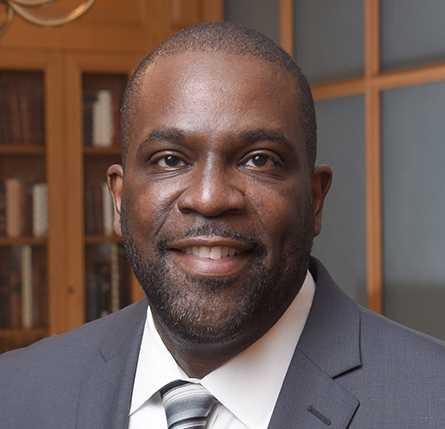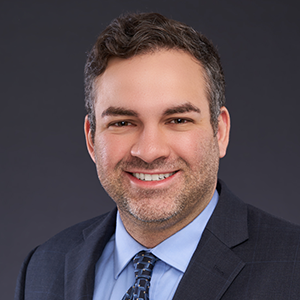
DeBose–Boyd has a recipe for success
Two of Russell DeBose–Boyd’s great passions are cholesterol synthesis and cooking. He says that being methodical, disciplined and focused are key ingredients of his approach to both, and this formula has guided his career.
Strong mentorship also has inspired his recipe for success, and he advises trainees on what to look for.

“First, find the right mentor, and that mentor doesn’t have to look like you” he said. “I’ve never had a mentor who looks like me, and yet I’ve had great mentorship. Your mentor needs to give you honest and helpful advice and have a track record of mentoring other successful scientists.”
“Second, build a mentorship team of people you trust who can guide your career and help you in professional development.”
DeBose–Boyd is a researcher and professor of molecular genetics at the University of Texas Southwestern Medical Center. His contributions to unraveling the complex regulation of cholesterol synthesis will be recognized at Discover BMB in March, where he will receive the American Society for Biochemistry and Molecular Biology’s 2023 Avanti Award in Lipids.
His colleagues lauded DeBose–Boyd’s expertise, life’s work and collegiality in their letters of support for the award.
Robert Farese Jr. of the Harvard T.H. Chan School of Public Health (a 2022 Avanti Award recipient) described him as “an outstanding colleague, who is always available and eager to discuss ideas and think creatively.”
Tom Rapoport of Harvard Medical School wrote that DeBose–Boyd’s discoveries “have clarified important aspects of lipid metabolism. His work on the regulation of HMG CoA reductase degradation is simply outstanding. The experiments are beautifully designed and executed.”
DeBose–Boyd also serves as an associate editor of the Journal of Lipid Research and a member of the Journal of Biological Chemistry editorial board.
And he offered a few last steps in his recipe for good science: “Ask an interesting, important and impactful question, because at the end of the day we must get our work funded.“Finally, have fun. Enjoy working with your hands, doing experiments, looking at results, writing papers; enjoy the process of being a scientist.”
How cholesterol regulation is linked to vitamin K2 synthesis
Russell DeBose–Boyd studies the highly regulated enzyme HMG-CoA reductase, the target of life-saving statin drugs that catalyzes a rate-limiting step in cholesterol synthesis. DeBose–Boyd has shown one mechanism for regulation of HMG-CoA reductase involving its sterol-accelerated degradation. He found that degradation of HMG-CoA reductase is inhibited by the protein UBIAD1, which uses geranylgeranyl pyrophosphate to synthesize a form of vitamin K2. Binding of geranylgeranyl pyrophosphate to UBIAD1 enhances HMG-CoA reductase degradation.
Mutations in UBIAD1 that prevent geranylgeranyl pyrophosphate binding lead to the stabilization of HMG-CoA reductase and overaccumulation of cholesterol. In animals, this accumulation results in a corneal disease called Schnyder corneal dystrophy that significantly impairs vision.
When mouse embryos are genetically altered to remove UBIAD1, they do not survive. DeBose–Boyd discovered that this embryonic lethality is not caused by vitamin K2 deficiency but by deficiency in HMG-CoA reductase that results from its enhanced degradation. He identified key residues in HMG-CoA reductase whose mutation blocked degradation and prevented the embryonic lethality associated with UBIAD1 deficiency. These UBIAD1-deficient mice are a novel model of vitamin K2 deficiency, and studying them will show new physiological roles of the vitamin.
2023 ASBMB award winners
Gira Bhabha: ASBMB Early-Career Leadership Award
Bhabha found creativity in hard science
Squire J. Booker: ASBMB–Merck Award / Ruth Kirschstein Diversity in Science Award
Booker catalyzes progress in science and outreach
Itay Budin: Walter A. Shaw Young Investigator Award in Lipid Research
Budin dives into the details
Scott Dixon: Earl and Thressa Stadtman Young Scholar Award
Dixon uncovers a new type of cell death
Catherine Drennan: William C. Rose Award
Drennan makes science fun and accessible
Anne Kenworthy: Mildred Cohn Award in Biological Chemistry
Kenworthy links quantity to theory
Keith Matthews: Alice and C.C. Wang Award in Molecular Parasitology
Matthews’ career-long search for truth
Eytan Ruppin: DeLano Award for Computational Biosciences
Ruppin synthesizes cross-field expertise to study synthetic lethality
Kerry-Anne Rye: ASBMB Mid-Career Leadership Award
Rye offers tools for success
Regina Stevens-Truss: ASBMB Award for Exemplary Contributions to Education
K-12 to undergrad, Stevens–Truss helps all students
Erica Ollmann Saphire: Bert & Natalie Vallee Award in Biomedical Science
Saphire is on the forefront of antibody therapeutics
Ajit Varki: Herbert Tabor Research Award
Varki seeks clues in chimps, grandmothers and sialic acid
Dyann Wirth: Alice and C.C. Wang Award in Molecular Parasitology
Wirth focuses on parasitology and policy
Enjoy reading ASBMB Today?
Become a member to receive the print edition four times a year and the digital edition monthly.
Learn moreGet the latest from ASBMB Today
Enter your email address, and we’ll send you a weekly email with recent articles, interviews and more.
Latest in People
People highlights or most popular articles

Building a career in nutrition across continents
Driven by past women in science, Kazi Sarjana Safain left Bangladesh and pursued a scientific career in the U.S.

Kiessling wins glycobiology award
She was honored by the Society for Glycobiology for her work on protein–glycan interactions.

2026 ASBMB election results
Meet the new Council members and Nominating Committee member.

Simcox wins SACNAS mentorship award
She was recognized for her sustained excellence in mentorship and was honored at SACNAS’ 2025 National Conference.

From humble beginnings to unlocking lysosomal secrets
Monther Abu–Remaileh will receive the ASBMB’s 2026 Walter A. Shaw Young Investigator Award in Lipid Research at the ASBMB Annual Meeting, March 7-10 in Washington, D.C.

Chemistry meets biology to thwart parasites
Margaret Phillips will receive the Alice and C. C. Wang Award in Molecular Parasitology at the ASBMB Annual Meeting, March 7-10 in Washington, D.C.

